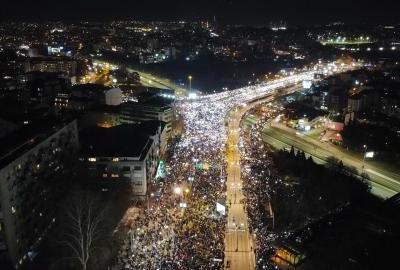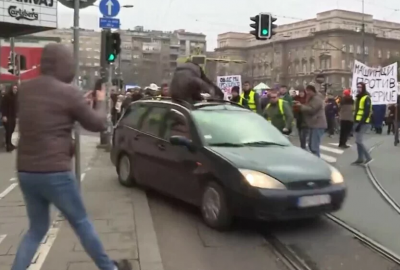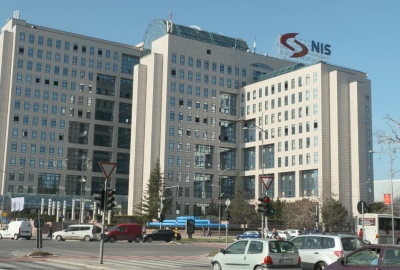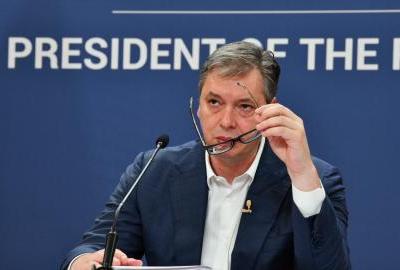Žurnal in English
HALLUCINATIONS OF FAKE PATRIOTS: They won't give up Kosovo, but they don't know what to do with it
The only serious policy would be one that would recognize Kosovo's independence, face the consequences of the Magnanimous hegemony and disassociate itself from the memorandum's ideological program. If someone finds the strength to go that way, they could also address the question: Did Serbia ever really want Kosovo to be part of it? Or has Kosovo played a different role in the ideological constructions here for two hundred years?

As soon as the news about the Franco-German proposal for Kosovo appeared, another wave of defence of the holy Serbian land was launched among the Serbian public. Such a custom prevails here, sometimes we defend the holy places in Montenegro, sometimes we worry about the status of a smaller entity in Bosnia and Herzegovina, then our attention turns to neighbouring Croatia, then back to Kosovo, and so on in a circle. It's easy for us, we've solved all the problems in Serbia, and there's nothing left to do, so we can calmly devote ourselves to solving open issues in neighbouring countries. And let the rest of the world prepare for our supernatural talent for organizing society and the state.
In the meantime, the French-German proposal was transformed into a European-Atlantic plan for Kosovo, which means that the entire European Union and the United States of America stood behind it. The plan has not been officially published, but the media have obtained different versions. No matter how it is turned, the bottom line is that Serbia and Kosovo will not interfere with each other in foreign affairs such as membership in international organizations, so it is a step towards lasting peace and containment of any potential conflict.
Russia's aggression against Ukraine led to turbulent changes in the world, to the creation of new divisions and the consolidation of the international community. The Western world is in a hurry to plug every hole where the Kremlin has influence, to prevent the outbreak of a new conflict that would benefit Vladimir Putin, because it would divert the attention of the EU and the USA from the destruction of Ukraine, slow down the flow of military and any other aid to the Ukrainians, and improve the position of Russia. Hence the impression that the Western envoys are in a hurry to resolve the relations between Kosovo and Serbia, and that they are pushing the whole matter over the knee.
National unity
Kosovo was discussed in the National Assembly for two long days. There was everything, from the bickering of the deputies and situations on the verge of a fight, through the competition in who loves and appreciates the Hague convict Vladimir Lazarevic more, to the eternal clash of who is a bigger Serb, who cares more about Kosovo, who is more successful and better at defending it.
President Aleksandar Vučić and his progressives with the right-wing opposition, Zavetniki, Dverjani, and the New DSS, were in high spirits, although the rest of the opposition did not show any substantial disagreement with the official version of the national mythology. The voices of reason remained in a distinct minority, as is our custom.
The government and almost the entire opposition agree that Kosovo is Serbia (regardless of the real situation on the ground), that the preamble to the Constitution is a true document and not mere fiction, and that we should not agree to Kosovo becoming a member of the United Nations and that we should never recognize Kosovo's independence. For almost the entire political scene, Kosovo is the heart of Serbia, which by some miracle, unknown how and why, found itself outside the motherland by mistake, but this is only a temporary situation, and the task of us and all future generations is to fight by all means so that Kosovo becomes part of Serbia again.
Elites in the wedge, citizens in the plate
It is devastating to see how the people we elected to manage this country in unison nurture the pernicious illusion that cost us all dearly, achieving an enviable level of national unity. To make the whole thing more bizarre, our political elite, media and public scene do not reflect the attitudes of the population regarding Kosovo at all. According to last year's research by the Institute for European Affairs, 44.2 per cent of Serbian citizens believe that Kosovo is lost, and 49.9 per cent think that it is not possible for Serbia to regain full control and sovereignty over the former southern province.
We see such a picture neither in parliament, nor among political parties, in intellectual circles, in the church, nor the media. Despite decades of brainwashing, a large part of citizens resisted mass hypnosis and kept in touch with reality. Unfortunately, this is not the case with the privileged layers of society who live very comfortably and richly from the virtual defence of Kosovo. For them, Kosovo is really "the most expensive Serbian word" and an eternal excuse for not doing their job, for not organizing their own country, and for being able to behave irresponsibly and arrogantly.
The Plan for Reintegration
The best comment on the session of the National Assembly was made by the representative of the Albanian minority, Šaip Kamberi, who said that he listened to what everyone does not want, but it was not clear to him what the Serbian politicians actually wanted, there was no mention of that. The question is really on point, so let's see what the defenders of Kosovo actually want, what their plans are, and what are the logical consequences of their positions.
Everyone agrees that Kosovo should be returned to Serbia. It is logical to assume that democratically oriented politicians would not use violent means in this endeavour, they are certainly against armed conflict. If they already yearn for the return of Kosovo, do they have any plan for reintegration? Which political and social forces in Kosovo are they planning to cooperate with within the framework of this project? What are these political parties, non-governmental organizations, social institutions, cultural institutions, activists, and prominent individuals? How do they think they can convince the Kosovo Albanians to become citizens of Serbia again, given that they suffered all possible reprisals, violence, and war crimes from the Serbian regime?
Of course, no plan exists and it is not possible to convince the citizens of Kosovo to join Serbia. There is no one in Kosovo with whom they could cooperate, it is simply the domain of non-scientific fiction, not real politics. All this is a transparent manipulation and a naked deception of the citizens that has been going on for decades, with no end in sight.
Trust in Russia
In contrast to democratic and civil politicians, the right-wingers had something personal on their agenda. They were waiting for Russia to conspire against the entire Western world, to dissolve the international order, to establish the rule of the stronger, which would then allow the domestic bloodthirsty to continue what they started in the nineties of the last century. The conflict with Kosovo should be kept frozen, in a dark and cold place, and then unfrozen when the so-called geopolitical circumstances change. Such hopes were fueled especially after the Russian annexation of Crimea in 2014.
When Russia started its aggression against Ukraine almost a year ago, Putinophiles here rejoiced that their hour had finally come. However, the "three-day special military operation" is not going exactly according to plan, so the tones of disappointment and despair increasingly dominate the part of the political public that drifts to the right. Since they are used to living in a world of phantasmagoria and hallucinations, ignoring reality, the current state of affairs on the ground does not worry them too much. If the time has not yet come for the realization of plans for the military conquest of Kosovo, that is not a problem at all, it will simply move the desired war into the future.
A look into the grave
This idea was perhaps expressed most simply by the vice-chancellor of the University of Belgrade, who said that immediately after the defeat in 1999, as soon as the capitulation was signed, "a dream began that has lasted for 23 years, and in five, ten, 50 or 500 years, the morning will dawn when we will start again for the what is ours, and that time means nothing". Nationalists are characterised by the frequent, almost natural forgetfulness that they are mortal. When the vice-chancellor says that "we" (the first person plural, which includes the speaker) will start a war of conquest, he forgets one seemingly insignificant detail - that he will not be among the living in half a century or five centuries, so he will be objectively prevented from participating in that great patriotic slaughter. It's strange how fans of the nation almost always miss that little detail.
What Radomir Konstantinović said in the text "Returning to Sarajevo", talking about the nationalists: "But instead of the nation, I would show him the cemetery - here he is on it tomorrow! But he will not look at the grave but at the nation. He is not crazy to look into the grave! If he is looking at the grave, he must be looking at the problem of existence. If he looks at the problem of existence, he must shake a little…” Eh, if nationalists were capable of such reflection, there would be no nationalism. Nationalism is a false answer to the problem of human mortality, the fact that the nation continues to live after the death of an individual is no consolation. Although the quoted vice-chancellor would probably not agree with that, he sees himself as immortal.
False obstacle
Neither the opposition nor the government has any serious plan for Kosovo. Vučić, admittedly, has no plan for anything, except to stay in power for as long as possible, he makes all decisions accordingly. When everything is put together, a logical conclusion emerges: none of the defenders of Kosovo actually want it to become part of Serbia again. The plan for Kosovo is actually unnecessary, because there is no open Kosovo issue, as most politicians, analysts, journalists, bishops, and intellectuals constantly repeat. There is Kosovo as Serbia's southern neighbour, an independent country that Serbia drove away from itself by all possible violent means.
The only serious policy would be one that would recognize Kosovo's independence, face the consequences of the Magnanimous hegemony and disassociate itself from the memorandum's ideological program. If someone finds the strength to go that way, they could also address the question: Did Serbia ever really want Kosovo to be part of it? Or has Kosovo played some other role in the ideological constructions here for two hundred years? For example, the role of a false obstacle that we set for ourselves, in order to delay the inevitable for as long as possible: to look into each other's eyes, to face ourselves and to look for our place in the world.
(zurnal.info)








